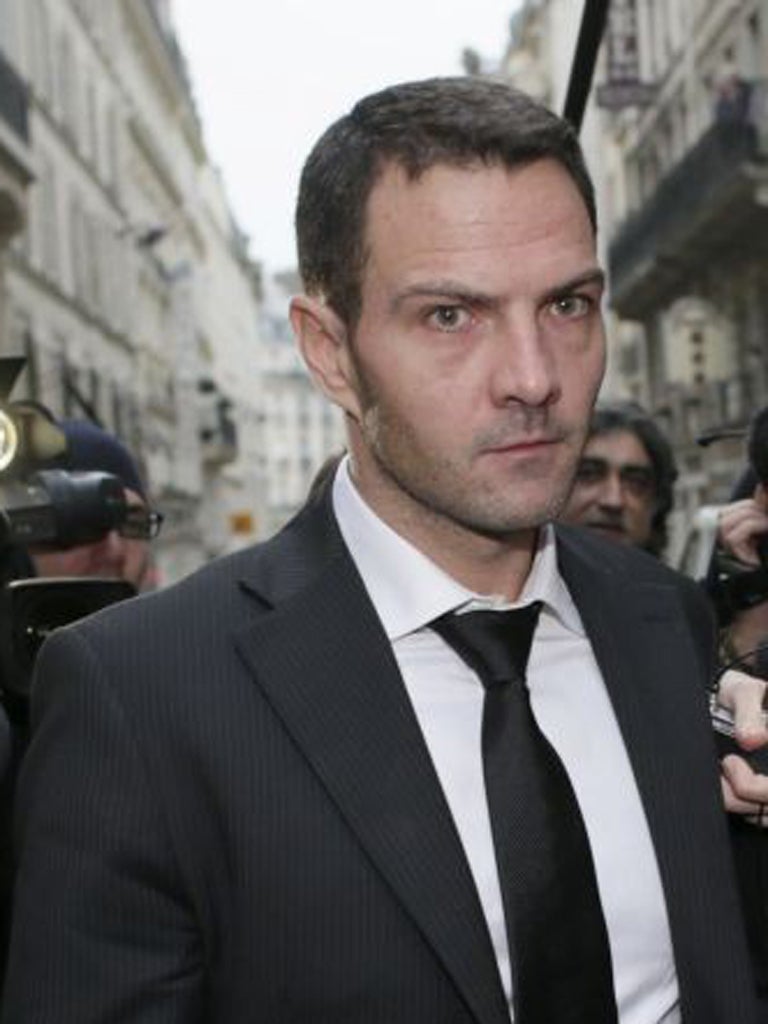French rogue trader Jérôme Kerviel jailed for three years and ordered to repay €4.9 billion (which he'll earn in 300,000 years)
Frenchman found responsible for biggest loss in trading history

Your support helps us to tell the story
From reproductive rights to climate change to Big Tech, The Independent is on the ground when the story is developing. Whether it's investigating the financials of Elon Musk's pro-Trump PAC or producing our latest documentary, 'The A Word', which shines a light on the American women fighting for reproductive rights, we know how important it is to parse out the facts from the messaging.
At such a critical moment in US history, we need reporters on the ground. Your donation allows us to keep sending journalists to speak to both sides of the story.
The Independent is trusted by Americans across the entire political spectrum. And unlike many other quality news outlets, we choose not to lock Americans out of our reporting and analysis with paywalls. We believe quality journalism should be available to everyone, paid for by those who can afford it.
Your support makes all the difference.Jérôme Kerviel, the most spectacular rogue trader in financial history, today lost his appeal and was jailed for three years and ordered to repay €4.9bn to his former employer.
Kerviel, 35, claimed during appeal hearings in June that the French bank Société Générale tacitly approved his risky trades and exploited the collapse of his position in 2008 to “bury” its own losses in the US sub-prime debacle.
The Paris appeal court today ruled that Mr Kerviel was solely responsible for the €4.9billion loss – the biggest in trading history – because he had evaded internal controls to make colossal, one-way bets of up to €50billion on European stock-market futures.
Mr Kerviel, now earning €30,000 a year in a computer company, is expected to seek leave to appeal to France’s highest court, the Cour de Cassation. In theory, even if he handed over all his after-tax earnings, it would take him around 300,000 years to repay his losses to SocGen.
The bank today said that it would not try to recover the whole sum but that it would claim any money that Kerviel received from book or film contracts.
The “affaire Kerviel” exploded in early 2008, at the beginning of the global financial crisis. Kerviel, a relatively junior trader, was found to have made massive one-way trades on the direction of European stock markets.
In theory, he was supposed to make simultaneous “bets” on stock exchange futures going up and down to earn modest amounts of money on tiny margins between the two. Instead, he “faked” covering trades and hacked into computers to defuse the bank’s internal safeguards.
For almost two years, Kerviel made large gains. In early 2008, the extent of his colossal exposure was discovered and SocGen unscrambled his positions, reporting a total loss of €4.9billion.
At his original trial in 2010, and at the appeal hearings this summer, Kerviel and his lawyers admitted that he had “lost all sense of reality”. But they called a string of witnesses who said that he was also a “victim” of a “greedy” world financial system which had itself lost touch with reality.
While Kerviel was winning, they argued, the bank tacitly approved his dealings. When he got into trouble, he was made a scapegoat for the bank’s wider losses in the financial crisis. The trader had never attempted to embezzle his “winnings” when his trades were succeeding, they said. His only obsession was to prove himself to be a master trader in the eyes of the bank.
In its ruling today, the Paris appeal court rejected this argument out of hand. “It is patently obvious,” the court said, “that the losses were caused by directional positions taken without authorisation for a total of €50billion, concealed by fictional positions for the same amount.”
Kerviel, the court said, had “clearly acted without the knowledge of his employer” in betting “exorbitant” amounts “wholly without cover”. The appeal judges upheld Kerviel’s October 2010 conviction in a lower court for forgery, breach of trust and unauthorized computer use. It confirmed the sentence of three years in prison, with two more suspended.
Kerviel’s lawyer, David Koubbi described the verdict as “an absolutely lamentable miscarriage of justice”. He said that his client would consider a further appeal. Kerviel remains free until that decision is made.
Counting the losses: The biggest losers
Ongoing: The ongoing trial against Kweku Adoboli has reached its sixth week. The 32-year-old former trader at Swiss bank UBS is accused of causing losses of $2.3bn and faces four criminal charges.
February 2009: Alexis Stenfors, former senior trader at Merrill Lynch, was banned from working in the City after admitting he deliberately overvalued his trading positions to hide losses of $100 million.
February 1995: Barings, one of Britain’s oldest investment banks, collapsed after Nick Leeson, a futures trader in Singapore, lost £860m in derivatives trading. He was jailed in Singapore.
Subscribe to Independent Premium to bookmark this article
Want to bookmark your favourite articles and stories to read or reference later? Start your Independent Premium subscription today.
Join our commenting forum
Join thought-provoking conversations, follow other Independent readers and see their replies
Comments